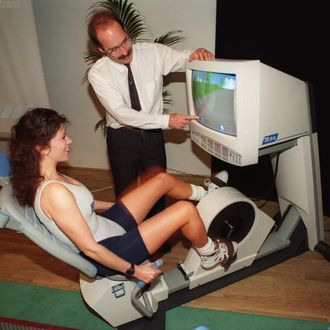
Throw away that hackneyed sports psychology book and toss out those testosterone pills of questionable provenenance, because a new study suggests there might be an easier way to improve your athletic performance: tricking yourself.
Ren-Jay Shei, a doctoral student at the Indiana University School of Public Health in Bloomington, had a group of 14 competitively trained cyclists complete a virtual course on a stationary bike once to familiarize themselves with it, and again to get a baseline reading of their speed and the power with which they peddled. Then things got interesting: Shei had them complete the course a third time alongside two avatars who appeared on the screen in front of them, whose speed and output stats were listed on the screen. The participants were told the avatar on the right had stats reflecting their (the participant’s) baseline performance, but in reality it was set 2 percent higher. As a result, the participants pushed themselves a bit harder and performed better as they attempted to compete with their previous effort.
The really cool part came on the fourth trial: Here, participants were told they’d been deceived the last round, that the avatar was set to go faster than their baseline performance. And yet the performance improvement lingered. It didn’t matter that the participants now knew they’d been tricked.
“More and more, scientists are recognizing the crucial role that the brain plays in fatigue development and pacing, beyond just motivation, and that’s pretty exciting stuff,” Shei wrote in an email. The key takeaway here is that we’re not always great judges of our physical limits, he explained: “Even when you’re pushing as hard as you can, your subconscious brain is keeping you at some sort of relative max, like the governor of a car. So if you can find a way to push past that limit, it opens the doors to further improvements.”
One has to be careful in how far to take this specific result, of course. This was a laboratory situation in which participants had cold, hard numbers to look at, which isn’t how exercise usually works in the real world. But it still ties neatly in to a lot of other research suggesting that our mental state during physical activity can go a long way toward dictating our performance.




